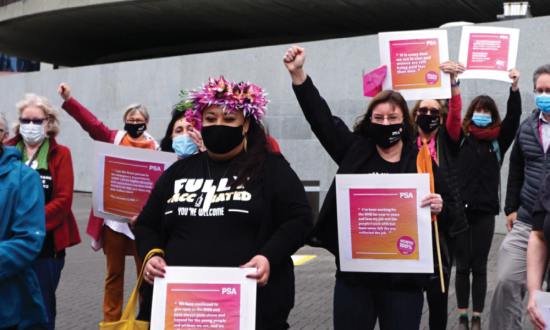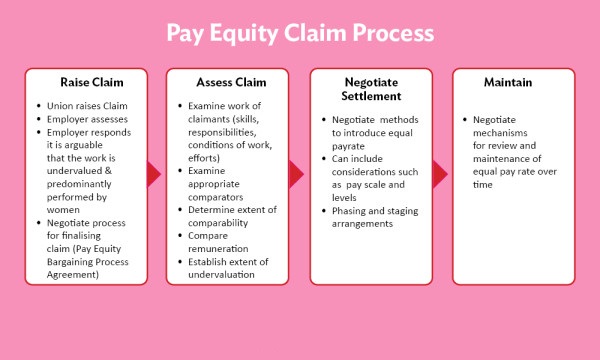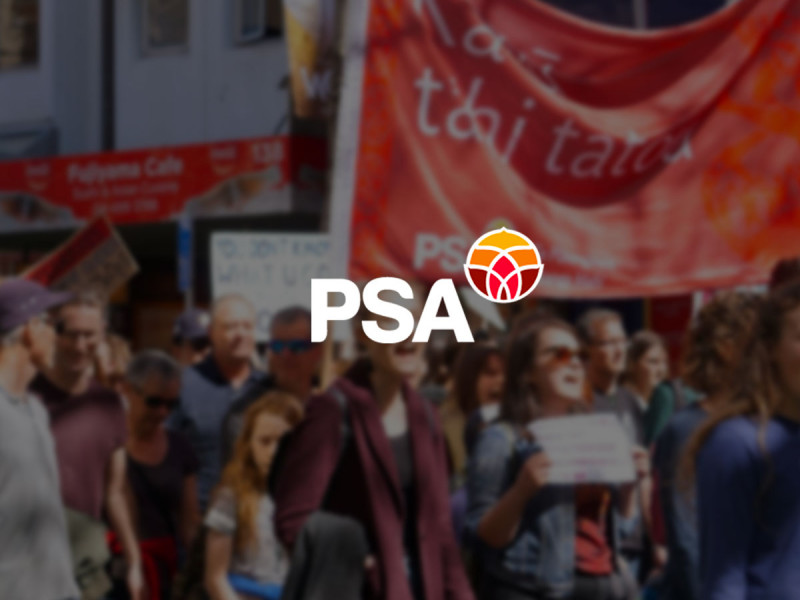Launched in 2014, Worth 100% is our campaign for pay equity across the community, health, local government, public service, and state sectors.
The PSA Te Pūkenga Here Tikanga Mahi has a proud history of advocating for equal pay, striving for pay and employment equality for women since 1913.
Our work towards Equal Pay is currently focused on two core areas of work: Pay Equity Claims, and the Gender Pay Principles (implemented via Gender Pay Action Plans).
We are taking a two-track approach to deliver on pay equity: using the force of new law to settle claims (the Equal Pay Amendment Act) and new guidance to end discrimination (the Gender Pay Principles and Guidance).
Keep reading to find out more!
Pay Equity
Pay Equity is about people in female dominated professions and people in male dominated professions receiving the same pay for doing jobs that are different, but of equal value. That is, jobs that require similar levels of skills, responsibility, and effort.
The PSA has been working on Pay Equity claims since 2018 - but the passage of the Equal Pay Amendment Act in 2020 has enabled a simpler process for raising and settling claims.
We are now party to a number of claims, covering tens of thousands of workers across all areas of the Public Service.

About Pay Equity
The terms “Pay Equity and “Equal Pay” are often confused. Equal pay means two people who are doing the same job should be paid the same regardless of their gender. Pay Equity means that women and men should be paid equal pay for work of equal value.
Gender pay gap: Gap between women’s average pay and men’s average pay.
Equal pay: Same job, same pay. (Sometimes, Equal Pay includes Pay Equity.)
Pay equity: Different job but of equal value, same pay.
Job evaluation: Tool to measure job size.
The gender pay gap is the difference between the average hourly rate for women and for men. It’s closing at a snail’s pace, and we’ve still got a long way to go.
Women graduates are paid, on average, 6 per cent less than their male counterparts at the very start of their careers. Within four years, they are earning nearly $5,000 a year less and the gap continues to widen.
In the public sector, women are paid 14 per cent less than men but it’s an average that conceals massive pay gaps, up to a staggering 42 per cent at the Ministry of Defence. In the community public services sector, support work is paid around one-third less than work with similar levels of skills and qualifications but largely done by men.
The gender pay gap represents a huge loss of earnings over a working life that can severely limit a woman’s choices and those of her children. It can mean the difference between a comfortable retirement and scrimping on food and heating costs.
Historically, there is a lot of work that has been traditionally considered as “women’s work”, and has therefore been performed predominantly by women.
This often falls along the lines of “caring work” such as healthcare workers, teachers, Social Workers, or work that is considered “low skill”, like administration workers. A large number of people in these professions are employed across the Public Service.
Over time, the pay for this kind of work has steadily fallen behind work in other occupations that might be of similar value, but has historically been performed by or associated with men (engineering, law enforcement, prisons).
This also means that men working in traditionally female-dominated professions may also be subject to pay inequities, and are therefore also covered by our claims.
Pay Equity is about establishing the extent of the undervaluation for those traditionally female dominated professions, negotiating a pay adjustment to remove undervaluation, and then maintaining pay rates over time to ensure that women never suffer from gender based pay inequities again.
This is one of the most important concepts in Pay Equity.
Value is about measuring work by all of the skills that go into it - not just the stated duties and qualifications. Different Pay Equity claims use different tools to measure the value of a role - but it includes things like:
- Knowledge (academic and non academic/lived experiences).
- Problem-solving (the kinds of problems someone faces in the workplace, what it takes to solve them, and what support they have in doing it)
- Interpersonal and communication skills (the skills required to communicate, establish and maintain relationships, the complexity of interactions, and the importance of outcomes).
- Te Ao Māori skills
- Planning and organisational skills (the nature and complexity of tasks, the level of uncertainty required, the level of autonomy and responsibility).
- Physical skills (physical or fine motor skills required on the job, and how hard they are to learn and perform).
- Responsibility for people leadership (both ‘direct’ leadership and leading through influence).
- Responsibility for information (gathering, processing, maintaining, developing information - as well as the sensitivity or significance of information managed).
- Responsibility for physical and financial resources.
- Responsibility for organisational outcomes.
- Responsibility for services to people (what services they provide to others, the importance or significance of these services).
- Emotional effort.
- Sensory effort.
- Physical effort (separate to physical skills - the physical intensity of the role and the impact of this on the person).
- Working conditions (the nature of the work environment - including pleasantness, hazards, and comfort).
Our Pay Equity process aims to identify and assess these factors (and more) to create a profile of different types of work. We then compare these profiles to profiles of comparable positions in male dominated areas. This allows us to establish the undervaluation of the work, which we then seek to address through negotiations.
Because many of these elements have historically not been measured for many female dominated occupations, this process could have a significant impact on pay for thousands of Public Service workers .
The Equal Pay Amendment Act (2020) establishes a standardised way to assess roles to see if they are undervalued.
This involves putting the role through a Pay Equity assessment tool, and then comparing it to a male-dominated profession of equal or similar value to see if there is a pay discrepancy.
We can choose from a number of different tools to use in a Pay Equity claim. You can read more about them below.
To read about Te Orowaru tool, click here.
To read about the HEJE tool, click here.

The Equal Pay Amendment Act establishes a standardised process for pursuing a Pay Equity claim. This process is broken into four parts:
- Raising the claim.
- Assessing the claim.
- Negotiating and settling the claim.
- Maintaining Pay Equity.
The Equal Pay Amendment Act (2020) was passed into law on 6 November 2020. It introduces a practical and accessible process for Pay Equity claims to be raised, considered and settled for female-dominated occupations.
The law means that:
- Unions can raise and negotiate Pay Equity claims directly with employers, rather than using an adversarial court process. This makes claims easier to raise and pursue, and ensures Pay Equity can be a positive collaboration between unions and employers. (Claims may still be brought to court as a last resort).
- There is a single process to follow in a Pay Equity claim. This includes a standardised process for assessing work and determining the existence of gender-based undervaluation. This process is broken into four parts:
- Raising the claim.
- Assessing the claim.
- Negotiating and settling the claim.
- Maintaining Pay Equity.
- All employees under the scope of a claim are included in the coverage. This means that Pay Equity claims will cover both union members and non-union members. It also means that any unions covering members within scope become co-parties to a Pay Equity claim. As a result, the PSA has now been joined by multiple other unions across a variety of claims.
Find your Pay Equity claim
Click on the links below to find out more about your Pay Equity claim.
This section is currently under development. Further information on Pay Equity claims will be available soon.
Care and support work has always been undervalued and underpaid, as the work is predominantly done by women.
Between 2017 and 2019 nearly 65,000 workers in aged care residential, home support, disability support, and mental health & addictions, received pay increases of between 15-50% thanks to Pay Equity.
In 2022, these workers received a further 3% increase as part of an extension of the Pay Equity settlement.
We believe the 3% was not enough, and we are pushing for further interim pay increases while we complete the Pay Equity process.
This page contains the latest information on the claim, as well as useful resources to help understand and promote the Pay Equity claim and campaign.

The Library Workers claim covers 1000+ staff working in local libraries. This claim was raised in 2019, and covers the six largest urban councils in New Zealand - Auckland Council, Tauranga Council, Hamilton City Council, Wellington Council, Christchurch Council and Dunedin Council.
When the claim was first raised, it covered Library Assistants, Senior Library Assistants and Shelvers. However, the claim team is currently exploring the possibility of extending coverage of the claim to Librarians, who we believe also face gendered pay inequities and do fit into the scope of this claim.
Campaign website: www.psa.org.nz/libraries
This page contains the latest information on the claim, as well as useful resources to help understand and promote the Pay Equity claim and campaign.

In 2019 the PSA lodged a Pay Equity claim for over 16,000 contact centre, customer service and admin/clerical workers across over 40 agencies in the public sector.
The claim has now grown to include four different unions - the PSA, TaxPro (at Inland Revenue), NUPE (Oranga Tamariki and Department of Corrections) and the New Zealand Police Association. The PSA and New Zealand Police Association are leading this work on behalf of the unions.
Campaign website: www.psa.org.nz/psadmin
This page contains the latest information on the claim, as well as useful resources to help understand and promote the Pay Equity claim and campaign.

The Allied, Public Health, Scientific and Technical (APHST for short) claim covers over 15,000 health workers, working in over 70 different professions. These professions include Social Workers, Occupational Therapists, Laboratory Technicians, Pharmacists, Alcohol & Drug Clinicians and many more. Basically, anyone working in health who is not a Doctor, Nurse, Midwife or Admin worker is likely to fall into this group.
The PSA represents roughly 11,000 APHST members. The PSA raised this claim in 2018 and, following the passing of the Equal Pay Amendment Act (2020), APEX became a party to the claim.
Following strike action in 2022, the PSA was able to secure a Collective Agreement settlement that included certain provisions around the Pay Equity claim such as: provisions for an interim payment and lump sum payment, provisions for establishing an effective date for the claim and, crucially, an indicative timeline for completion of the claim. We now hope to settle this claim in mid 2023.
Campaign website: www.psa.org.nz/allied
This page contains the latest information on the claim, as well as useful resources to help understand and promote the Pay Equity claim and campaign.
Raised in late 2018 on behalf of members covered by the PSA Mental Health and Public Health Nursing Collective Agreement.
Following the passage of the Equal Pay Amendment Act (2020) the PSA became a joint party to a claim with the New Zealand Nurses Organisation (NZNO) on behalf of all Nurses.
The settlement of this claim is currently stalled. This is due to disputes to do with backpay and Senior Nursing rates being considered by the Employment Court and Employment Relations Authority respectively.
In early 2023, Te Whatu Ora agreed to make provisional and interim payments to members based on rates agreed to prior to the disputes arising.
Equal Pay Delivery Plan
The PSA is taking a two-track approach to deliver on pay equity: using the force of new law to settle claims (the Equal Pay Amendment Act) and new guidance to end discrimination (the Gender Pay Principles and Guidance).
Kia Toipoto is the Public Service Action Plan (2021-2024) for closing gender, Māori, Pacific, and Ethnic pay gaps. Pay equity claims processes and Kia Toipoto, in combination, will address all of the workplace drivers of pay gaps.
Te Orowaru is a revolutionary new pay equity work assessment tool aimed to help recognise the value of cultural skills in work, including te reo Māori. This tool is the first of its kind in Aotearoa New Zealand and the first in the world with a key focus on indigenous peoples.
The pay equity assessment process allows us to look beyond what task someone is doing to understand and properly value work. Pay equity settlements are powerful vehicles for closing gender, Māori, Pacific and ethnic pay gaps, particularly for vulnerable workforces.
Te Orowaru was developed in partnership with Te Kawa Mataaho, the New Zealand Council of Trade Unions and agency pay equity practitioners.
Gender Pay Gap Action Plans are another lever the PSA is using to address employment inequalities. These action plans aim to deliver on equal pay, flexible work arrangements, the elimination of bias in remuneration, and gender-balanced leadership.
It is through Gender Pay Gap Action Plans that the Gender Pay Principles (the framework for eliminating gender pay gaps) are implemented. They are a joint initiative of the PSA and government, in collaboration with agency chief executives.
Most public service departments have completed or are making action plans as required by Government. The plans are expected to make a real difference for women through improvements to starting salaries, the introduction of flexible work by default pilots, and changes to parental leave provisions.
Planning is underway to roll out the gender pay principles to the wider public sector, in line with the Public Service Act. The focus will continue to be on gender inequities but will now include ethnicity as well, working to address inequalities experienced by Māori, Pasefika, and other ethnic groups.
We are also seeking to spread the reach of the gender pay principles into all workplaces, no matter where our members work.
Kia Toipoto and Te Orowaru | Public Service Pay Gap Action Plan (2021-24)
Launched on 15 November 2021, Kia Toipoto is the new gender, Māori, Pasefika and ethnic pay action plan. Te Orowaru is a revolutionary new tool designed to understand and measure the skills, responsibilities, effort and experience workers bring to their workplaces every day in Aotearoa New Zealand. This Action Plan aims to close gender and ethnic pay gaps across the public service, state sector and DHBs, building on the Public Service Gender Pay Gap Action Plan.
Representatives from the PSA's Te Rūnanga o Ngā Toa Āwhina, PSA Pasefika, and PSA members from other ethnic minority groups have helped develop the plan, alongside Te Kawa Mataaho, the Ministry for Women, Te Puni Kōkiri, the Ministry for Pacific Peoples, the Ministry for Ethnic Communities and employee-led networks.
In PSA media:
2021 October | Putting principles into practice
Developed by the Gender Pay Principles Working Group, the Gender Pay Principles are a framework for creating work environments free of gender-based inequalities. The aim of the principles is the elimination of gender pay gaps.
The Gender Pay Principles Working Group is a tripartite working group of unions (including the PSA), agencies, and government, established in 2017 following a PSA legal claim of discrimination against the Public Service.
A set of guidance to implement the principles is now complete, following the publishing of guidance on remuneration, and career progression, breaks and leave. The PSA and Te Kawa Mataaho have developed the guidance in collaboration with other members of the Gender Pay Principles Working Group.
While the guidance talks about gender discrimination, the principles will help eliminate all discrimination. While the Public Service is obliged to use the guidance, it's hoped it will have a flow-on effect for other workers.
The guidance is available here on the Te Kawa Mataaho | Public Service Commission Gender Pay Gap and Pay Equity web page.
The Gender Pay Principles:
- Freedom from bias and discrimination
- Transparency and accessibility
- Relationship between paid and unpaid work
- Sustainability
- Participation and Engagement
Gender Pay Guidance to implement the principles covers:
- Flexible work by default
- Ensuring gender is not a factor in starting salaries
- Ensuring gender is not a factor for same or similar roles
- Recruitment
- Career progression, breaks and leave
- Remuneration
In PSA media:
2018 July 02 | Gender Pay Principles another step towards pay equity
2018 July 03 | Gender Pay Principles launched!
2020 December | Delivering on Equal Pay
2021 October | Putting principles into practice
Equal Pay Advocates are PSA members (male, female, and non-binary) who are the champions of pay equity in big and little ways in their individual workplaces and homes. Several of our sister unions have similar groups of members championing equal pay in their workplaces and our combined efforts can get the whole country behind us and achieve 100% equal pay in the next few years.
Want to become an Equal Pay Advocate? Fill out the form below, or email janine.bridgeman@psa.org.nz and ask to to be added to the Equal Pay Advocates list.







